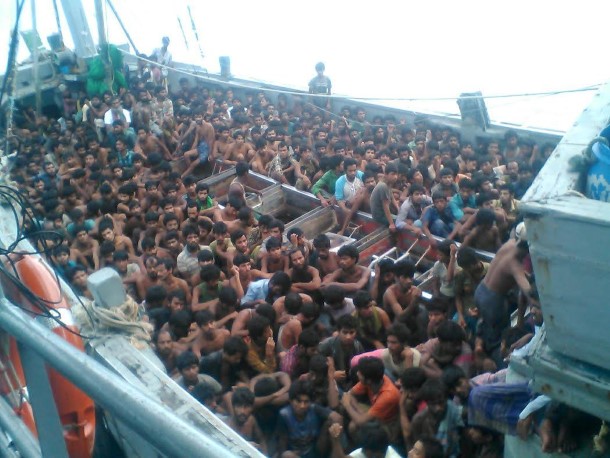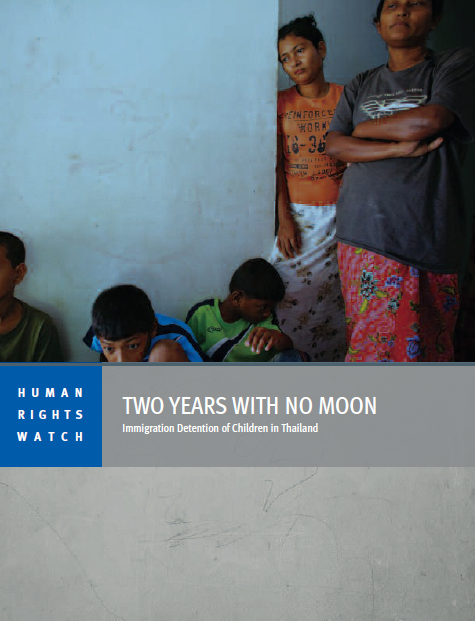Posts Tagged ‘International Organization for Migration’ (5 found)
A Regional Solution to the Refugee Crisis Must Address Root Causes
 On 29 May 2015, Thailand hosted the long-awaited Special Meeting on Irregular Migration to address the unfolding refugee crisis in the Andaman Sea. The talks brought together representatives from 19 nations mainly in the ASEAN region, along with delegates from the UN High Commission for Refugees (UNHCR), UN Office on Drugs and Crime (UNODC), and the International Organization for Migration (IOM). At the time of the meeting, the Arakan Project has reported that at least 6,000 refugees, mainly Rohingya, are unaccounted for and likely stranded at sea. Victims of discrimination and denied even basic human rights back in Burma, these individuals are risking malnourishment, dehydration, and abuse in order to escape repressed lives under the Burma Government.
On 29 May 2015, Thailand hosted the long-awaited Special Meeting on Irregular Migration to address the unfolding refugee crisis in the Andaman Sea. The talks brought together representatives from 19 nations mainly in the ASEAN region, along with delegates from the UN High Commission for Refugees (UNHCR), UN Office on Drugs and Crime (UNODC), and the International Organization for Migration (IOM). At the time of the meeting, the Arakan Project has reported that at least 6,000 refugees, mainly Rohingya, are unaccounted for and likely stranded at sea. Victims of discrimination and denied even basic human rights back in Burma, these individuals are risking malnourishment, dehydration, and abuse in order to escape repressed lives under the Burma Government.
As more and more refugees are rescued from the squalid conditions at sea, survivor accounts have begun to emerge. Human Rights Watch recently published accounts that detail the dangerous journey from Burma, including stories involving traffickers intentionally abusing the refugees in order to hasten ransom demands, being forced at gunpoint into departing refugee boats, and the cramped and overcrowded conditions of the boats used to transport the refugees. A 16-year-old Rohingya girl described her experience on board the refugee boat, “When I got to the big boat … I cannot explain my feeling I was so scared. We were about 16 people in one small room. The doors were always locked. The smugglers put the food and water through a small hole, we never saw them.” […]
• • •Joint Statement By UNHCR, OHCHR, IOM And SRSG For Migration and Development: Search and Rescue At Sea, Disembarkation, and Protection of The Human Rights of Refugees and Migrants Now Imperative To Save Lives in The Bay of Bengal and Andaman Sea
We, the undersigned*, strongly urge the leaders of Indonesia, Malaysia, and Thailand, to protect migrants and refugees stranded on vessels in the Bay of Bengal and the Andaman Sea, to facilitate safe disembarkation, and to give priority to saving lives, protecting rights, and respecting human dignity […]
• • •Southeast Asia: End Rohingya Boat Pushbacks
(Bangkok, May 14, 2015) – Thailand, Malaysia, and Indonesia should end their pushbacks of boats with Rohingya and Bangladeshi migrants and asylum seekers, and instead bring them ashore and provide desperately needed aid, Human Rights Watch said today […]
• • •Two Years With No Moon: Immigration Detention of Children in Thailand
Every year, Thailand arbitrarily detains thousands of children, from infants and toddlers and older, in squalid immigration facilities and police lock-ups. Around 100 children—primarily from countries that do not border Thailand—may be held for months or years. Thousands more children—from Thailand’s neighboring countries—spend less time in this abusive system because Thailand summarily deports them and their families to their home countries relatively quickly. For them, detention tends to last only days or weeks.
But no matter how long the period of detention, these facilities are no place for children.
Drawing on more than 100 interviews, including with 41 migrant children, documenting conditions for refugees and other migrants in Thailand, this report focuses on how the Thai government fails to uphold migrants’ rights, describing the needless suffering and permanent harm that children experience in immigration detention. It examines the abusive conditions children endure in detention centers, particularly in the Bangkok Immigration Detention Center (IDC), one of the most heavily used facilities in Thailand […]
• • •Thailand: Migrant Children Locked Up
Thailand holds thousands of migrant children in detention each year, causing them physical and emotional harm, Human Rights Watch said in a report released today. Child migrants and asylum seekers are unnecessarily held in squalid immigration facilities and police lock-ups due to their immigration status or that of their parents […]
• • •









 All posts
All posts